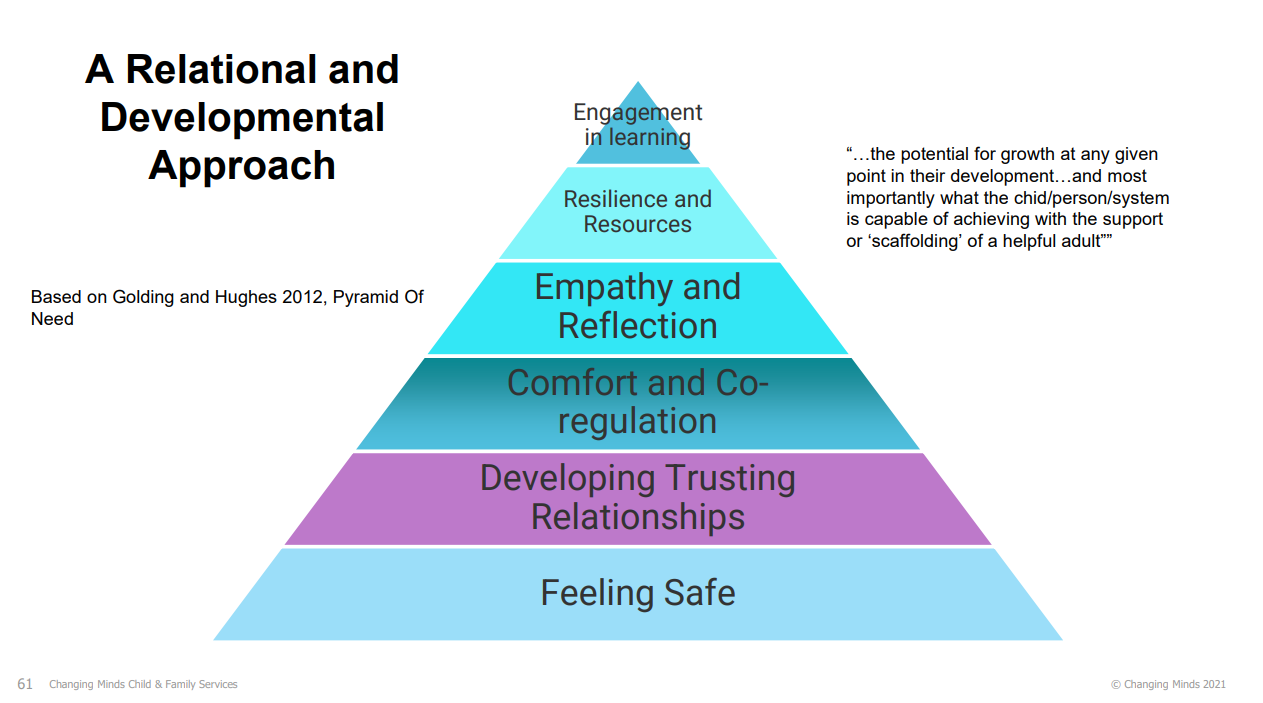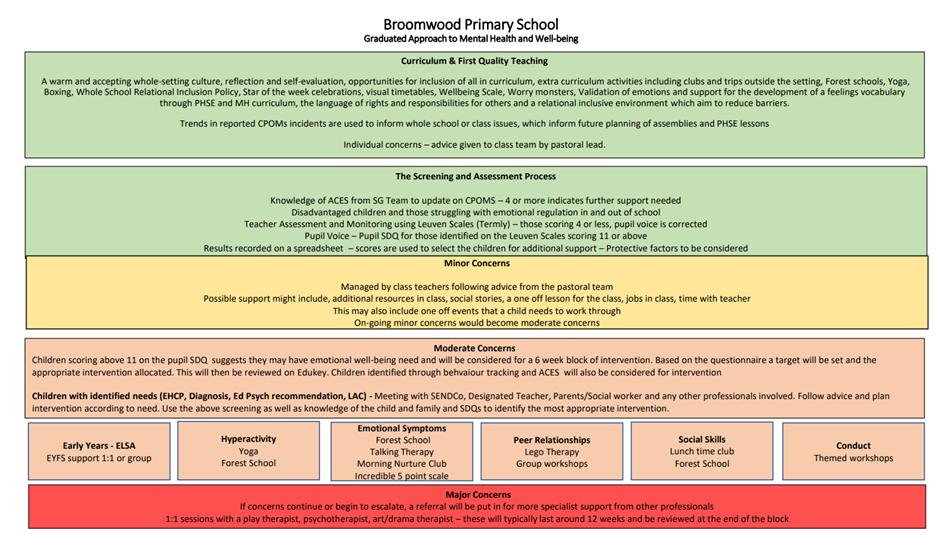Mental Health and Well-Being
At Broomwood Primary School, pupil health and wellbeing are an absolute priority - we believe that in order for pupils to learn best they must first feel psychologically safe. Research shows that as many as 35% of pupils may not have formed a secure attachment in infancy and this impacts on their social, emotional and academic development. We also recognise the connection between Adverse Childhood Experiences, and community environments, on mental and physical health.
Our core values of Welcoming, Nurturing, Respect, Commitment and Togetherness are at the heart of everything we do.
Intent
At Broomwood Primary School it is our intention to provide a mental health and well-being curriculum which ensures children develop good attachments, feel psychologically safe and are emotionally ready to learn. Research states this will provide the best outcomes for children. 
By the time children leave our school, in Year 6, it is our aim that they;
- Have good emotional vocabulary and how emotions feel in their bodies
- Have developed some resilience to life stresses and know where to go for help
- Have calming strategies to help manage their emotions
- Have knowledge of themselves, their triggers and how to respond to them
- Have an awareness of how the brain works and what makes them feel good
- Have positive experiences in school, enjoy school and feel success
In line with the NICE Report 2008, we have adopted a ‘whole school approach’ to supporting social and emotional health. We consider mental health and wellbeing of pupils at every level; within our culture, ethos and everyday practices and response. Our aim is that our school environment, as a whole, has a positive impact on the mental health and wellbeing of all pupils from Pre-school to Year 6.
We recognise that factors such as SEND, experiencing traumatic events, poverty and other adverse Childhood Experiences have a negative impact on pupil wellbeing. We understand the impact of ‘toxic stress’ on brain development and aim to limit this by being attachment aware and trauma responsive. This is done through a Relationally Inclusive approach which benefits all children and not just those affected by trauma and attachment.
Through our knowledge of the children and our assessments, we seek to identify emerging issues quickly, assess the need and respond in the most appropriate manner through our graduated approach. Our intention is then to provide support and continue a plan, do review cycle.
Curriculum Overview
|
|
EYFS |
KS1 |
LKS2 |
UKS2 |
|
Phase Provision |
|
|
|
|
|
Whole School Provision |
Yoga 5-a-day Star of the week Visual Timetables Well-being scale Helping Hands Re-set box Relational Inclusion PSHE Curriculum Core Values and British Values Transition days |
|||
|
Special Events |
Anti-bullying week, Mental health awareness week, PE week, Outdoor learning day, World Kindness Day, Outdoor Learning Day
|
|||
Graduated Approach to Mental Health and Wellbeing

Implementation
In order to promote positive mental health, we believe that wellbeing should be considered throughout our whole curriculum, ethos, policies and how we respond to children on a day to day basis.
Relational Inclusion – This is the approach through which we create a positive culture within school where children are taught what appropriate behaviour looks like, how behaviour is linked to emotions and how we as individuals (both adults and children) can deal with these emotions. It forms our approach to behaviour and outlines how we, as adults, respond to children when different behaviours are experiences. It is a whole school approach based around restorative practice. As relationships are at the heart of this approach, we dedicate 3 days at the start of the year to get to know each other and each time a child starts our school we prioritise a ‘getting to know you’ activity during their first week. Each morning staff go out to great the children in their class and make a point of speaking to each child individually to welcome them. The purpose of this is to do daily check-ins with children so that you are able to pick up quickly on any changes/worries but also to help the children feel a sense of self-worth when a member of staff has remembered something about them.
Environment – Our classrooms are set up to promote calmness, predictability and safety. Calm, neutral colours are used for displays and where possible classrooms keep ‘fuss’ to a minimum so as not to overwhelm the children. Within each classroom there is;
- A reset box
- An emotion scale
- A worry monster (EYFS & KS1) or a worry box (KS2)
- Access to water
- Calm corner
Teaching Approach – We use a multi-sensory approach to our teaching where collaborative/exploratory learning is encouraged, this is to allow all children to access learning and feel success. Due to strong adult/child relationships staff are able to ‘read’ their class and make adjustments to their lessons if required. This may involve a whole class reset or a change of direction if children are struggling.
PSHE – Across EYFS we follow the Think Equal programme and then in KS1 and KS2 we follow the Relationships and Health Curriculum Framework. This curriculum includes the three strands of Health and Wellbeing in the Autumn term, Relationships in the Spring term and Living in the Wider World in the Summer term. This is progressive curriculum and is taught on a weekly basis.
Mindfulness – During PPA sessions staff complete a mindfulness activity with the children each week. This might be colouring, listening to some music, meditation, visualisation, a run or some additional fresh air.
Personal Development – Within the school year we provide additional personal development experiences for the children. The purpose is to broaden their experiences and give them opportunities to experience success in different ways. This includes things such as trips and visits as well as outdoor learning, yoga, playing a musical instrument and musical theatre.
Training – All staff have training linked to Trauma as part of their induction as well as an overview of our relational inclusion policy, including the reset process. Within school we also have a senior mental health lead, a mental health first aider and a well-being team who oversee the implementation of our mental health and wellbeing curriculum.
Intervention - We recognise that, as within other aspects of learning, some pupils may need additional support with their mental health and wellbeing. We aim to identify these at the earliest opportunity by assessing children on a termly basis using the Leuven Scales and taking the time to understand a family’s story. Pupils are supported within school by specially trained staff who offer targeted, evidence-based interventions and, if needed, referred to more specialist services.
Impact
The impact of the Mental Health and Wellbeing Curriculum at Broomwood Primary School, is that children are prepared for the next stage of their educational journey because socially and emotionally they are in a position to engage with it effectively. Through our robust approach children will;
- Have formed secure attachments and be able to transition to high school and feel success.
- Have developed a bank of strategies that they can use in order to manage their emotions effectively.
- Have a good understanding of themselves, their emotions and their triggers and be able to manage them effectively.
- Be resilient and able to ‘bounce back’ from challenges they face.
- Have a positive mind set and have the confidence and resilience to try new things without fear of failure.
- Be able to recognise positive relationships and their importance in the development of good mental health and wellbeing.
- Prioritise their own mental health and wellbeing.
